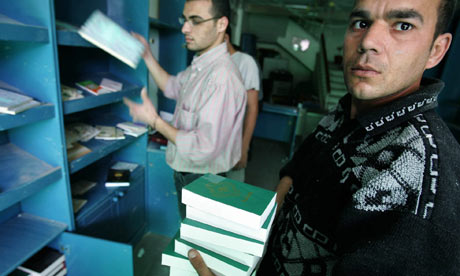
The Middle East generates huge amounts of news coverage, but as the New Yorker pointed out last month, only recently has literature documenting people's daily lives in the region started winning western readers. In the case of the Israel-Palestine conflict, while some writers (Amos Oz and David Grossman spring to mind) are closely associated with it, many more authors don't make it onto the radar.
A new public book club recently took some small but heroic steps towards addressing this by promoting writing by Israeli and Palestinian writers that focuses on the conflict. Its opening night attracted around 20 people who met above a north London pub, their interest piqued by the chance to encounter different perspectives within this complex debate. The discussion was led by writer and lecturer Ariel Kahn and Palestinian novelist Samir El-youssef, who set up the book club in collaboration with the Jewish Community Centre in London.
The club is intended to help people "listen deeply to other voices" in the Israel-Palestine conflict, as Kahn explained. While media coverage of Israel and Palestine often provides simplified narratives, novels insist on complexity, demanding that we consider individual characters and stories. Crucially, in a debate where so many have a vested interest in not listening to the other side, literature opens up a space where we can encounter multiple perspectives. (El-youssef has experience here, having collaborated on the short story collection Gaza Blues with Israeli author Etgar Keret, which was written to show that dialogue was still possible after the second intifada of 2000.)
The night was a roaring success; the room fizzed with energy as we discussed Arabesques by Anton Shammas. The book sparked controversy when it was first published in 1986 for being the first novel written in Hebrew by an Israeli-Arab, a demographic that accounts for 20 per cent of the Israeli population but remains seriously marginalised. Blending novel and autobiography, the book explores what it means to be both Arab and an Israeli citizen by charting Shammas's attempts to become recognised as an Israeli author, rather than an outsider in what he saw his own country. Along the way it also weaves a dense tapestry of family stories that richly detail life in a vanished world: the villages of Arab Palestine, now annexed by Israel. The novel casts "a spell against forgetting", using storytelling to replace absence.
The discussion that followed was a reminder that in this way, fiction is often at its most powerful when it confounds our expectations – whether emotionally, politically or intellectually. For example, one scene from Arabesques that raised eyebrows around the room was the moment when the Israeli army descends on the Arab village of Fassuta in 1948, during the expulsion of thousands of Palestinians from their homes. It's a moment where you might expect the utmost solemnity. But instead, Shammas provides a moment of pure comedy: ridiculously, the villagers begin to dance:
"And thus they stood, the [Jewish soldiers] on the one side and the inhabitants of Fassuta on the other, until from somewhere a mijwez was whipped out and to its strains the men who had come back from the fields arranged themselves in a semicircle and their feet responded as if of their own accord to the rhythm of the melody."
But while this baffled some of us, Kahn argued that "being presented with something painful can make you feel coerced into a particular response", which can in turn leave you feeling nothing. By contrast, humour opens up a space for you as the reader, giving you options for how to respond. It's a liberating force, and can awaken compassion that might otherwise have gone untapped.
Literature brings a human dimension to our understanding that nothing else can. As Adhaf Soueif, founder of the Palestine Festival of Literature, said to me recently: "To read a story, you have to care about its characters – that act of empathy can be a short-cut into a situation." The moment you make that daring leap into another person's shoes, literature stops being a solitary pursuit and becomes something quite different: a radical act.

